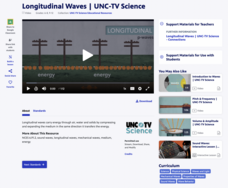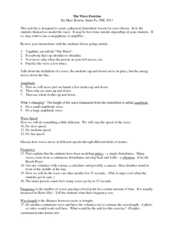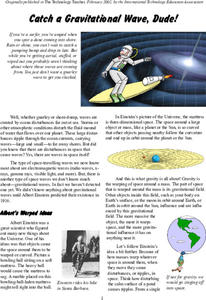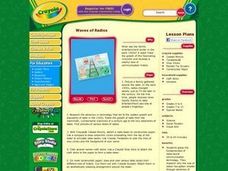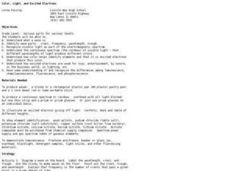Waves Teacher Resources
Find Waves lesson plans and worksheets
Showing 4,099 resources
Curated OER
STEMbite: Standing Waves
The casual voice of the filmmaker explains standing waves using a linked chain bordering a neighborhood parking lot, a bucket of blue-colored water, and a rope tied to a fan blade. He uses the appropriate vocabulary (frequency,...
Curated OER
Sound Waves
This non-narrated video shows the effect sound waves have on a chlandni plate full of sand. Watch the sand morph into different patterns based on the frequency played. Ironically, this sound waves video has no sound! Have your physics...
PBS
Electromagnetic Waves | UNC-TV Science
These waves aren't for surfing. Young scientists learn about electromagnetic waves and how their features affect the light people see. The video lesson describes the amplitude, frequency, and wavelength of the waves and how the...
Curated OER
General Relativity: Gravitational Waves
What is a gravitational wave, and did Einstein describe it correctly? Learn how Einstein's theory was challenged over time, proved to be correct, and what gravitational waves are. This is an informative clip describing the phenomena of...
Curated OER
Harness the Waves
Scotland would like to lead the way in wave technology. The power of the ocean's waves can be converted into usable energy. This fascinating video explores this innovative technology for using waves as a renewable energy source. Even...
PBS
Longitudinal Waves | UNC-TV Science
Discover whether sound travels in space and other fascinating science facts. Scientists explore energy transfer by longitudinal waves and learn about compression, rarefaction, amplitude, and wavelength while watching an animated video....
California Department of Education
Sound Waves
Resonate with the class. By watching a couple of videos, pupils realize that sound waves require a medium to travel and can break glass. They then listen to a lecture on resonance and work through a lab to calculate the speed of sound...
Curated OER
The Oceans, Waves, Tides & Currents
Your introductory lesson to oceanography can be outlined with this apropos presentation. It touches on the physical features of the ocean floor, waves, tides, and currents. One small issue is that some of the graphics are not of the...
Curated OER
Standing Waves and Music: Suggested Demonstrations
There are four embedded links in this brief resource that take you to handouts or worksheets that assist young musicians in understanding standing sound waves. They'll play their instruments to show and then discuss different sound...
Mr. E. Science
Characteristics of Waves
Waves, waves, and more waves. Here, class members look at the many types and characteristics of energy waves including transverse, longitudinal, standing, seismic, p-waves, s-waves, and l-waves.
Columbus City Schools
Making Waves
Learning about waves can have its ups and downs, but a demo-packed tool kit has the class "standing" for more! Learners gain experience with several different wave types, organizing observations and data, and wave...
The Science Spot
The Wave Exercise
During a lesson on wave motion, physical science participants basically act out the waves as a group. Through their movements, the amplitude, speed, frequency, and wavelength are all identified. Ideas for modeling the reflection and...
It's About Time
Inferences of Waves
Building on the previous lesson, scholars use Slinkies to create standing waves. They graph waves on a calculator and then apply their knowledge to both sound and light waves. This is the fourth in a series of nine lessons.
NASA
Catch a Gravitational Wave, Dude!
It is cowabunga time! Pupils read an article about the NASA LISA mission on gravitational waves and conduct additional research on them. The class participates in a science bowl type competition about gravitational waves. Panels of four...
K12 Reader
Waves & Currents
Challenge your young readers with a passage about physical science. After reading about sound waves and electric currents, kids answer five reading comprehension questions about what they have read.
Physics Girl
How Science Explains Monster Waves
Ride the learning wave in an episode of a comprehensive physics playlist. Youth learn about the existence of rogue ocean waves and their behaviors. The instructor discusses the chaotic effects of multiple wave collisions.
Crash Course
Light Is Waves: Crash Course Physics #39
Help your classes visualize light as a wave using an engaging video lesson. The 39th lesson of the Crash Course physics series highlights the characteristics of a light wave. The lesson continues by analyzing the behavior of waves...
Cornell University
Light Waves: Grades 6-8
Explore the behavior of light with different materials. Collaborative groups determine whether certain materials absorb, reflect, diffract, or transmit light waves. They then measure the angle of incidence and angle of reflection.
Berkeley University of California
Light as a Wave
Let's break down light into the waves that produce it. The series on chemistry of light begins by explaining the features of the waves that create light including speed, wavelength, and frequency.
Curated OER
Waves of Radios
Students grasp the fundamentals of radio/sound communication technology. They research why the size of radios has gotten smaller through advances of technology...from large radio tubes through transistors through microchips. Students...
Curated OER
Let's Do the Wave!
Young scholars distinguish waves from matter, differentiate between transverse and longitudinal waves, use sine curves as representations of transverse waves, label characteristic properties of waves, diagram transverse waves having...
Curated OER
The Phenomenon of Sound: Waves
Students explore sound waves. In this sound waves lesson, students brainstorm different sounds and how sounds move or travel. Students then create a KWL chart and work through six different lab activities to examine how sound waves...
Khan Academy
The Mohorovicic Seismic Discontinuity, Cosmology and Astronomy
The phenomena observed in the behavior of waves and data received from seismographs can lead us to various conclusions about the densities of material waves passing through.
Curated OER
Color, Light, and Excited Electrons
Investigate color, light and excited electrons and produce waves using slinkys. Your high schoolers will observe a continuous spectrum with a prism and an overhead projector. They observe flame tests to identify elements and they observe...
Other popular searches
- Sound Waves
- Light Waves
- Waves Physics
- Tidal Waves
- Light and Sound Waves
- Electromagnetic Waves
- Seismic Waves
- Ocean Waves
- Radio Waves
- Waves Powerpoint
- Properties of Waves
- Earthquake Waves







